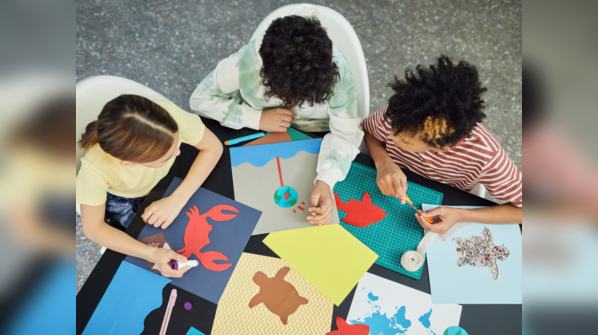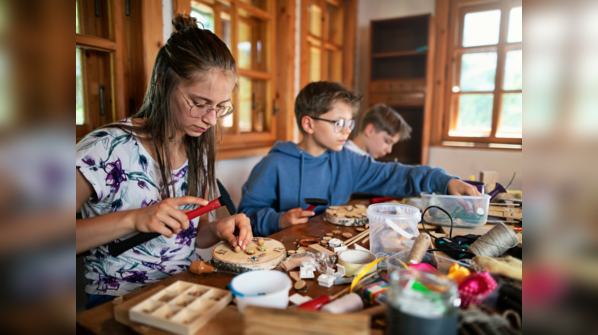Just like adults, children require motivation to thrive and develop into their best selves. Growing up presents numerous distractions, but mastering the ability to overcome them is crucial. Procrastination can lead to future disadvantages. As Robert Kiyosaki wisely said, "Your future is created by what you do today, not tomorrow," emphasizing the importance of present actions.
Here are some valuable tips to help children minimize distractions and enhance their focus:

Avoid resorting to punishment as a primary method for improving focus. This can often lead to rebellion. Instead, embrace positive reinforcement. This approach can be a potent tool in helping a distracted child recognize what truly matters. Simple words of praise, like "Good job!" or "Great work!", can have a significant impact. Such positive feedback can stay with them, prompting them to reconsider actions that might lead to trouble.

Constantly pressuring children to study, learn new things, make friends, or engage in any activity can actually increase their distractibility. It’s natural for children to get distracted easily. However, pressuring them, rather than patiently guiding them, can make them more resistant. With time and patience, children will learn to direct themselves and find their focus.

Overwhelming children with large tasks can lead to feelings of pressure and avoidance. Children need time to process information; their minds can only handle so much at once. Instead of tackling the assigned work, they might prefer engaging in activities they enjoy, such as playing video games, spending time outside, or hanging out with friends. By breaking down tasks into smaller, more manageable chunks, the overall workload appears less daunting. They are then more likely to complete them on time, especially with positive encouragement.

Consider your own preferences. Would you willingly engage in something you find boring? Probably not. Similarly, children need novelty. While it’s not about turning everything into a game, making tasks more engaging can increase their focus and boost productivity. Transform mundane activities into captivating experiences. Involve children in everyday tasks, such as setting the table or teaching them basic sequencing activities. These activities often capture their attention, ultimately improving their focus.

Parents naturally strive to provide the best for their children, including their diet. While kids can be picky eaters, often avoiding essential greens and proteins, a balanced diet plays a vital role in their development. Prioritize protein-rich foods, limit junk food, and strictly avoid excessive sugar intake to help improve concentration levels. A balanced diet, with occasional treats in moderation, is key.

Completely restricting children’s access to technology is often unrealistic in today’s world. Instead, focus on setting time limits. Determine when and how much screen time is allowed, as well as the types of shows they can watch. Research indicates that children tend to perform better in environments that are free from distractions and stress. Encourage children to explore the outside world and appreciate the beauty of nature, rather than solely focusing on indoor activities.

Consider your own experience: As an adult, can you effectively perform tasks and give your best effort without proper sleep? A consistent sleep schedule significantly impacts a child’s ability to focus and their willingness to engage in activities. Children are more likely to concentrate better after a good night's sleep. Aim for 9-12 hours of sleep to prevent crankiness from hindering their focus.

Newer articles
Older articles
 Emma Raducanu Shuts Down Carlos Alcaraz Dating Rumors, Confirms US Open Mixed Doubles Partnership
Emma Raducanu Shuts Down Carlos Alcaraz Dating Rumors, Confirms US Open Mixed Doubles Partnership
 Woakes Regrets Umpiring Decisions as India Seize Control on Day 1 at Edgbaston
Woakes Regrets Umpiring Decisions as India Seize Control on Day 1 at Edgbaston
 Black Caps Primed for Blockbuster Home Summer Against Cricket Giants
Black Caps Primed for Blockbuster Home Summer Against Cricket Giants
 Gambhir Defends India's Tailenders After Test Collapse, Cites Missed Catches as Key Factor
Gambhir Defends India's Tailenders After Test Collapse, Cites Missed Catches as Key Factor
 SA20 Teams Given Green Light for Six Player Retentions Ahead of Auction
SA20 Teams Given Green Light for Six Player Retentions Ahead of Auction
 Rishabh Pant: Revolutionizing Cricket with Unconventional Batting, Says Greg Chappell
OR
Greg Chappell Hails Rishabh Pant as Cricket's "Reinventor"
Rishabh Pant: Revolutionizing Cricket with Unconventional Batting, Says Greg Chappell
OR
Greg Chappell Hails Rishabh Pant as Cricket's "Reinventor"
 Mirabai Chanu: Olympic Medalist's Relentless Training Regimen Extends Even to Family Time
Mirabai Chanu: Olympic Medalist's Relentless Training Regimen Extends Even to Family Time
 Rishabh Pant's "Game-Changing" Centuries vs. England Earn Praise From Greg Chappell
Rishabh Pant's "Game-Changing" Centuries vs. England Earn Praise From Greg Chappell
 Small Steps, Big Heart: Science Reveals Simple Habits for Optimal Cardiovascular Health
Small Steps, Big Heart: Science Reveals Simple Habits for Optimal Cardiovascular Health
 Kavya Maran, SRH CEO, Addresses Viral Meme Status and Passion for Cricket Team
Kavya Maran, SRH CEO, Addresses Viral Meme Status and Passion for Cricket Team